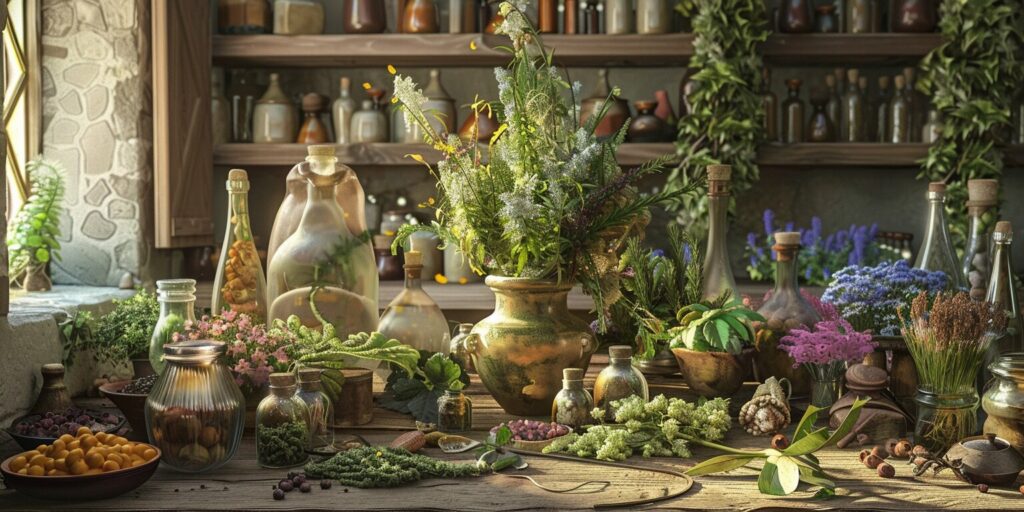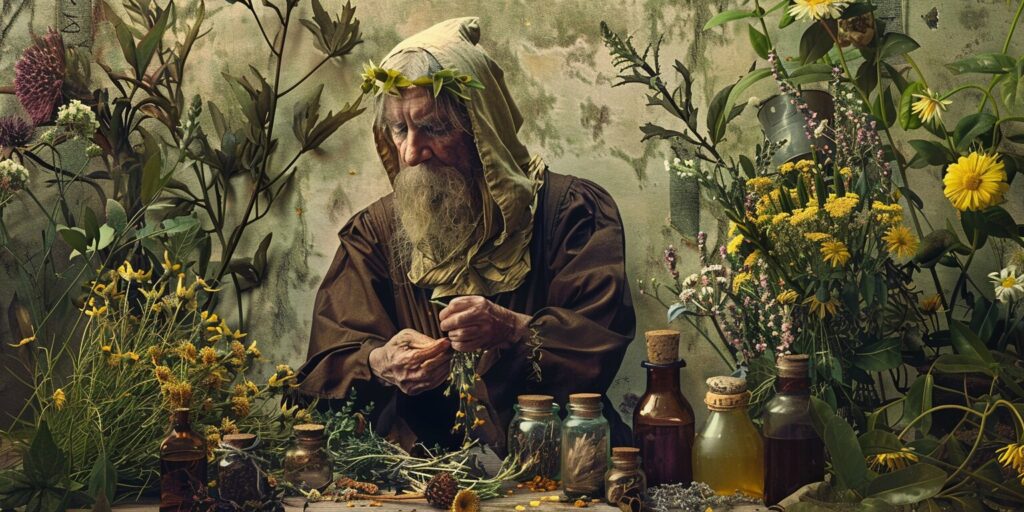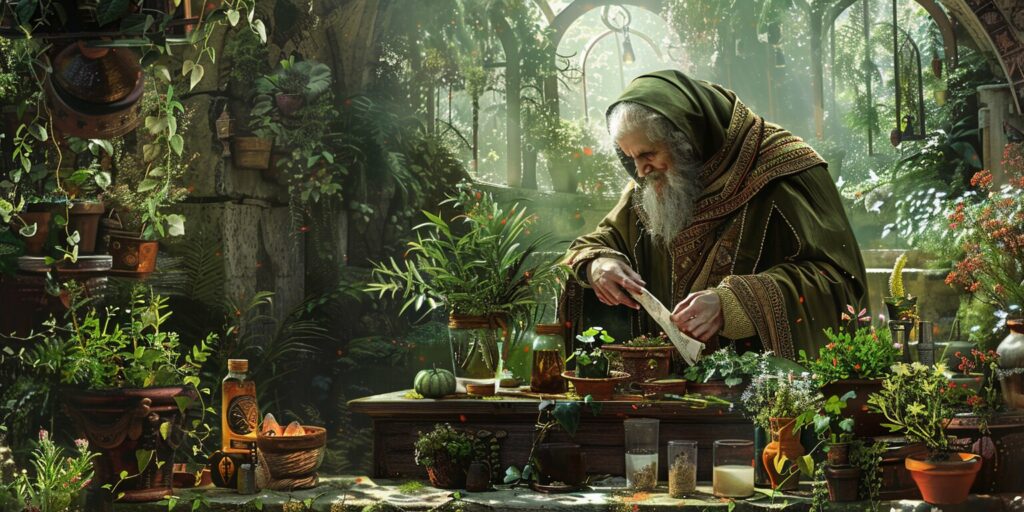Medieval herbalism was an important aspect of medicine during the Middle Ages. Herbalists, who were pivotal to the history of medicine, were individuals who studied and practiced the use of medicinal plants to treat various ailments. They had extensive knowledge about different herbs’ properties and their healing properties. Herbalists played a crucial role in healthcare during the medieval period, utilizing natural remedies to alleviate symptoms and promote overall well-being.
What is Medieval Herbalism?
In the Middle Ages, herbalism emerged as a prominent form of medical practice, highlighting the integral role of medicine in this period. Influenced by ancient Greek and Roman traditions, medieval herbalism further developed during medieval times. Herbalists during the Middle Ages relied on knowledge passed down through generations and tradition to understand the healing properties of medicinal plants. They used a combination of observation, experimentation, and folklore to determine the efficacy of different herbs.
The Origins of Herbalism in the Middle Ages
The practice of herbalism in the Middle Ages was built upon the foundation of ancient Greek and Roman knowledge. These civilizations placed great importance on medicinal plants, so their traditions and practices influenced medieval herbalism. Over time, herbalism evolved to incorporate new discoveries and cultural practices, becoming essential to medical treatment during the Middle Ages.
Key Characteristics of Medieval Herbal Practice
- Knowledge Passing Through Generations: Medieval herbalists, encapsulating the essence of Anglo-Saxon medicine and the broader history of herbalism, relied on the wisdom and teachings passed down through generations to understand the properties and uses of medicinal plants.
- Observation and Experimentation: During this period, herbalists closely observed the effects of different plants and conducted experiments to determine their therapeutic properties.
- Mixture of Science and Folklore: Medieval herbalism was a unique blend of scientific observation and folklore traditions. In the history of medicine, the efficacy of herbal remedies was often determined through a combination of scientific methods and cultural beliefs.
Use of Medicinal Plants in Medieval Times
Medieval herbalists utilized a wide range of medicinal plants to create remedies for various conditions and illnesses. Depending on the ailment being treated, these remedies were prepared in different forms, such as teas, poultices, and ointments. The use of medicinal plants, a cornerstone of European herbalism, in the Middle Ages played a crucial role in providing healthcare and promoting well-being.

Medicinal Plants and Remedies
Medieval herbalists possessed extensive knowledge of medicinal plants and their therapeutic properties, a testament to the rich history of medicine. They utilized them to create herbal remedies for various ailments. Popular medicinal plants used in medieval herbalism, which form part of the rich tapestry of the history of herbalism, included rosemary, chamomile, lavender, and sage. These plants, integral to the herbal tradition, were believed to possess healing properties that could alleviate digestive, respiratory, and skin problems.
Herbalists combined medicinal plants with other natural ingredients to create effective remedies. For example, they incorporated honey, vinegar, and animal fats into their preparations. This integration of different elements resulted in potent herbal treatments that targeted specific health concerns.
Folk medicine practices were prevalent during the Middle Ages and heavily relied on the use of herbal ingredients. These practices, passed down through generations, formed an integral part of community healthcare. Herbal treatments were trusted remedies for various conditions, with folk medicine practitioners using their knowledge of medicinal plants and traditional techniques to address ailments.
The Influence of Herbalism in Medieval Medicine
Herbalism played a significant role in traditional medieval healthcare. Herbalists were crucial members of the healthcare system and often worked alongside physicians and other medical practitioners. They offered alternative treatment options, deeply rooted in early medieval herbal tradition, that relied on the use of medicinal plants. The integration of herbalism into medieval medicine provided patients with diverse treatment options. However, it is important to note that medieval herbalism differs significantly from modern medicine in terms of diagnostic methods, treatment approaches, and overall scientific understanding.
Integration of Herbalism in Traditional Medieval Healthcare
Medieval herbalism was seamlessly integrated into traditional healthcare practices. Herbalists, adhering to European herbalism practices, played an essential role in diagnosing and treating ailments using medicinal plants and herbal remedies. They possessed an in-depth knowledge of the healing properties of various herbs and were able to provide effective treatments for a wide range of conditions.
Herbalist’s Role in Treating Ailments during the Middle Ages
The herbalist’s role in medieval medicine was significant. They assessed patients, identified their ailments, and prescribed appropriate herbal remedies. Herbalists utilized their expertise in medicinal plants to alleviate symptoms and promote overall well-being. Their holistic approach to healthcare focused on addressing the root cause of an illness rather than simply alleviating symptoms.
Comparison of Medieval Herbalism with Modern Medicine
While medieval herbalism played a vital role in healthcare during the Middle Ages, it is important to recognize the differences between medieval and modern medicine. Modern medicine has evolved significantly from its roots, incorporating rigorous scientific research, advanced diagnostic tools, and evidence-based treatment approaches, a far cry from the practices of medieval history. While herbal remedies are still used in modern medicine, they are often integrated as complementary or alternative therapies rather than primary treatments.
Legacy of Medieval Herbalists
The impact of medieval herbal practice has left a lasting imprint on later medical traditions, shaping the development of herbal medicine in different cultures. The knowledge and practices of medieval herbalists have influenced the use of medicinal plants and herbal remedies across generations. Even today, many of the herbal remedies and practices from medieval times persist, serving as a testament to the recognition of their healing properties.

Impact of Medieval Herbal Practice on Later Medical Traditions
The influence of medieval herbalism can be seen in the development of various medical traditions that emerged after the Middle Ages. Medieval herbalists’ deep understanding of medicinal plants and their therapeutic properties laid the foundation for the incorporation of herbal medicine in different cultural contexts. The knowledge and techniques passed down by medieval herbalists guided later generations in their exploration and utilization of herbal remedies.
Persistence of Herbal Use Today from Medieval Times
The use of herbs as a form of treatment and healing, a practice deeply ingrained in the history of herbalism, has stood the test of time. Many of the herbal remedies and practices employed by medieval herbalists, echoing the depth of medieval history and the herbal tradition, continue to be utilized today, showcasing the enduring legacy of their medicinal wisdom. From teas and tinctures to poultices and ointments, the medieval tradition of herbal use remains relevant and valued in modern healthcare.
Continuing Themes from Medieval Herbalism in Modern Healthcare
While modern medicine has evolved significantly, traces of medieval herbalism can still be found in contemporary healthcare practices. The emphasis on natural remedies and the recognition of the holistic approach to health and well-being are enduring themes that can be attributed to the influence of medieval herbalists. The belief in the healing powers of medicinal plants and the integration of herbal knowledge into modern healthcare demonstrates the lasting impact of medieval herbal practice.
Final Thoughts
Medieval herbalism played a significant role in shaping the practice of medicine during the Middle Ages. Herbalists, such as Hildegard von Bingen and Gerard of Cremona, possessed deep knowledge of medicinal plants and used their expertise to provide essential healthcare services. Their contributions to the well-being of individuals cannot be overstated.
Although the field of herbalism has evolved over time and is now integrated into modern medicine, the legacy of medieval herbalists lives on. Their wisdom and techniques continue to influence healthcare practices today, helping us understand the therapeutic properties of plants and the importance of natural remedies in promoting overall health and wellness.
By studying the practices of medieval herbalists, modern medicine has been able to build upon their foundation. The scientific exploration of herbal medicine, the development of standardized herbal preparations, and the recognition of the valuable contributions made by traditional healers all stem from the roots of medieval herbalism.

